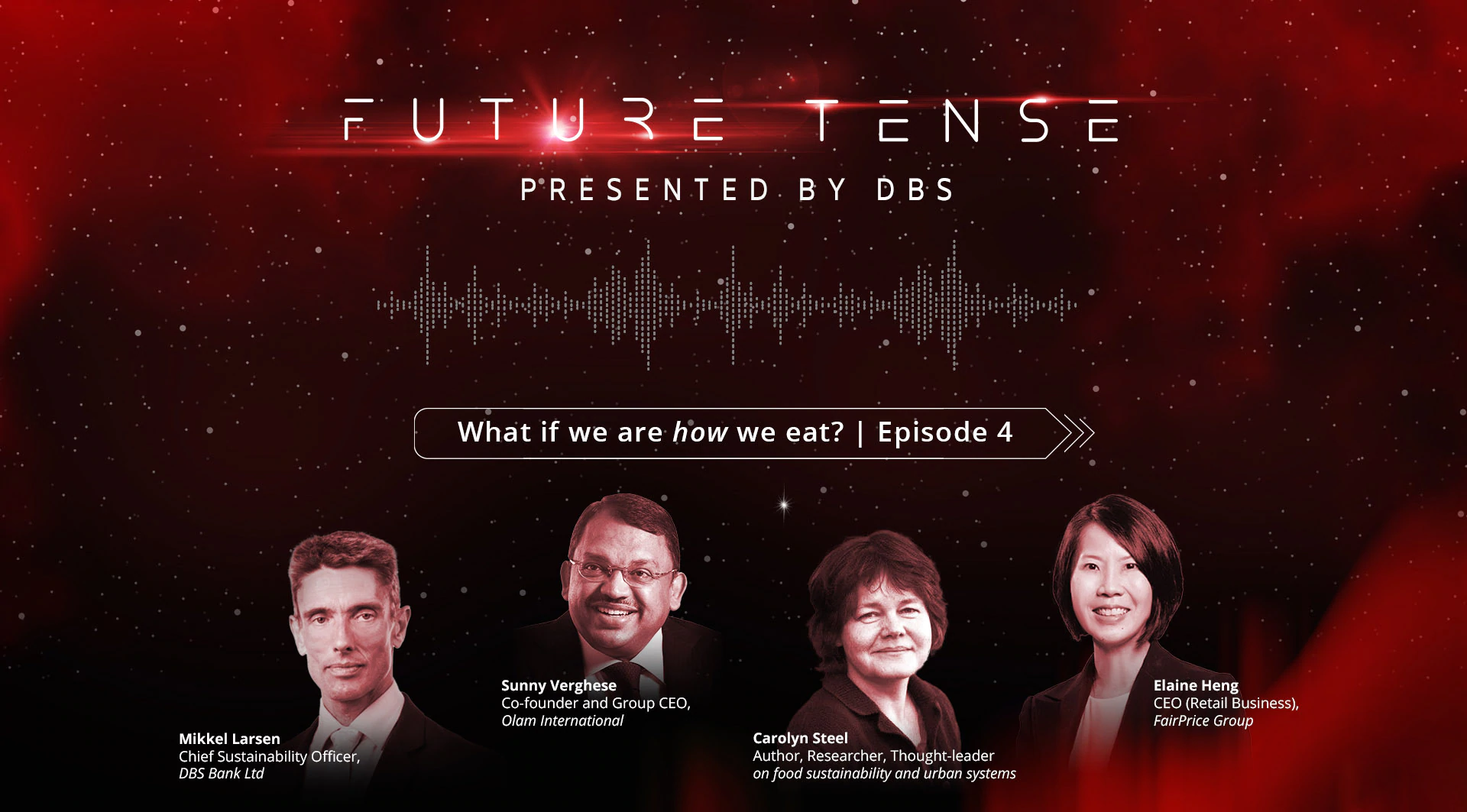Listen to this story
00:00
21:59
Subscribe to our podcast:
In brief:
-
“Today, the global food and agricultural system is clearly broken”, and the way we produce food is not sustainable.
-
A free market has produced a system where cheap food is the expectation. The true value of food has been forgotten.
-
Consumers in Singapore are willing to pay more for sustainably-produced food, but only up to 10-15% more.
-
Many environmental conventions and pacts have failed to live up to their targets because individuals and companies are still not compelled or incentivised to change.
-
We need to redefine our vision of a good life so that it’s a win-win for people and planet.
-
If we learn to adopt an environmental intelligence, we will be better able to change as individuals.
-
Companies and company leaders should take charge and make their environmental targets public with transparent reporting. Government mandates will be needed to make this happen.
Welcome to Future Tense, by DBS. We look at what's to come for Asia and the world as technology evolves at an accelerating pace. We get you comfortable with the future as business leaders tackle big questions about sustainability, innovation, fintech and more.
As Covid-19 moved across borders, various countries faced challenges with food as supply chains were abruptly cut. Back in April 2020, it was reported in the news that hundreds of tonnes of fruit and vegetables had to be thrown away by Malaysian farmers – a situation also seen in many other countries across the globe.
And while these massive amounts of food were being dumped, many people, especially those in need, were facing food shortages. There was panic-buying at supermarkets, and food was not getting into the hands of those who needed it most.
It was an exaggerated glimpse into what the world was already facing before the pandemic struck. The business of food failing the basic function of food – which is to feed.
Our guests today look at inequity and imbalance through the lens of our food system, while calling for change in the future of our society. Because what if we aren’t what we eat, but how we eat?
Sunny Verghese is co-founder and group CEO of Olam International, Elaine Heng is CEO of Retail Business of Singapore’s largest grocery retailer – FairPrice Group, and Carolyn Steele is an author, researcher and thought leader on food sustainability and urban systems.
They were part of the DBS Asian Insights Conference 2020, on the panel ‘Food for All – Building a Food-secure Future’, with Mikkel Larsen, Chief Sustainability Officer at DBS moderating. We listen in on parts of that discussion.
The problem too big to not fix
Mikkel: Sunny, perhaps more than anybody, you understand some of the deep-rooted problems that exist in supply chains. What in your view is the single largest problem with our food system today?
Sunny: The single biggest problem is the sustainability of food. We have seven and half billion people on the planet today. We are going to grow to about nine and a half billion in the medium fertility scenario by 2050. So how do we feed, clothe and provide food, feed and fibre to this growing population without destroying the planet?
Today, the global food and agricultural system is clearly broken.
We account for 25% of the world's greenhouse gas emissions, excluding the greenhouse gas emissions coming from food waste. We account for 71% of the world's freshwater withdrawals. And we are also contributing to between 70 - 75% of the world's biodiversity collapse. And we still have 817 million people going to bed hungry every day. And we have 709 million people who are earning below $1.90, in terms of being below the poverty line, 55% of them are small-holder farmers.
So how do we make farmers and farming systems more prosperous? How do we fix the nutrition problem and the wellbeing problem of people who eat and consume food? And finally, how do we get food companies to transform from within, making sure that we don't have biodiversity collapse, or we don't add to the greenhouse gas emissions problem?
We roughly have nine million species of plants and vertebrates and insects in the world. And if you look at the amount of these species going extinct, Earth's scientists who have drawn up the nine planetary boundaries basically say that we cannot afford to lose more than 10 species for every million species that we own each year. Against the 10, we are losing roughly a thousand species for every million species that we own each year. So about 40% of all the mangroves in the world in the last 40 years have disappeared. We have lost about a billion hectares of forest land in the last 40 years. Right now, we are losing forest land at the rate of roughly 30 million hectares a year.
So, we have a serious problem on how we are going to sustainably produce food to meet the growing demands of a growing population.
Mikkel: Those are amazing figures, but also very sad in many ways. So over to you, Elaine, if I could ask you the same question. What would you characterise as the biggest problem?
Elaine: First, I'd like to define what a sustainable food system is. I see a sustainable food system as one that delivers food security and nutrition needs of the community without compromising on economic, social as well as environmental concerns.
So, if I can just pause and talk about these three elements of economic, social and environmental, and cast them as profit, people, and the planet. And we look at the entire food system and how these three components have to come together to ensure that the system is working efficiently and properly to sustain the population.
And what this means is that, number one, I do think all players in the value chain have to come together where there's some elements of economic gain so that they can continue to play their role. Secondly, the food system has to generate enough to feed the population, including the most marginalised communities. And third, the food system has to ensure that we treat the very limited environmental resources that we see today with care because there's so much scarcity these days.
And if we think about it, then to answer your question, the biggest problem I see in terms of the food system today is that not all actors are fully aligned with these principles. And this is exactly what I think Sunny has basically shared, where we are looking at one in three people who are malnourished in the world today.
We see about 600 million people who go to bed hungry. But on the other end at the same time, in the rest of the world there's overconsumption, there's obesity. We have 30% of food waste.
So food produced to be consumed is being thrown away and wasted completely.
We see natural resources that are being depleted very quickly. And environmentally unsustainable agriculture where we do not price in the true cost of carbon from transporting and producing the food to us.
So actually, that's a whole lot.
Singapore being a very small country with very limited farming space, 90% of our food is actually imported. This basically means that we are vulnerable on three fronts.
We are vulnerable in terms of the disruption of food supply – there'll be fluctuations of food or it will be cut off completely or we’ll run short. There'll be fluctuations in terms of price because we are a price taker from food producers and also in terms of food safety because of overseas incidents.
The good news is that we do have quite a robust food security plan and it requires a multi-pronged approach where we basically look at different contract farming, we have stockpiling, we have the imports, we have local production, as well as government to government contracts, and augmenting with the education of people on food waste.
Mikkel: Thank you for a very good answer. If I could just have a very quick follow-up question with Carolyn, because it seems to me, Carolyn, for the longest time we've known about these problems. I listened to one of your podcasts when you were presenting on your book, only to realise at the end that this was actually something you presented in 2009. Everything you said then could have been true today. So if we know these issues, why are we not solving them?
Carolyn: Well, I would say that particularly in industrialised countries, the main problem is that we've forgotten the true value of food. So certainly in the UK and countries like the US, we spend less on food than we have historically ever. And we've got these very efficient systems for producing it. But, of course, that efficiency excludes a lot of the things you were just talking about. For example, biodiversity and people working in farming – which I happen to think, if we do value food, is a wonderful life and many people are actually drawn to it.
So, I think it's this expectation that food should be cheap. And we've achieved the illusion of cheap food by externalising its true costs.
Food comes from the natural world and basically it's the most powerful thing connecting us to one another on the one hand, and to nature on the other hand. So there is just nothing more valuable. And by expecting it to be cheap and by sort of trying to solve the problem and letting the market solve the problem for example, we've gone down this path of basically saying cheap food above all else is what people want.
For 99% of our history, we were hunter gatherers. And we, in the very, very last shred of human existence, we've become farmers. And with farming came hierarchy and cities. And with that became this sort of split between the people who produced the food and the people who control the food.
But feeding people's always been really difficult. The food problem's always been the biggest problem. So, when industrialisation came along around 200 years ago, food companies began to evolve, like the ones that Elaine and Sunny run today.
Politicians globally tended to sort of wipe their brows with relief and go, “Thank goodness I don’t have to be responsible for this anymore.” So actually, most politicians globally don't control the food system. The food system is controlled by companies, and unfortunately a lot of them are not nearly as ethical or sustainably-minded as Elaine's and Sunny's are.
And it's very awkward for politicians to admit that they don't have control of this, and they're also terrified of going anywhere near food because the one thing people generally hate being told is what to eat and how to eat.
So certainly in the West again, you know, I think a lot of the problems that both Sunny and Elaine mentioned, they come from this kind of abnegation of responsibility for food away from our leaders, as if it's this kind of thing that will sort itself out somewhere over there, according to the market. And, of course, we know this isn't happening.
Whose behaviour and expectations need to change first?
Mikkel: And maybe I could actually just turn to you then, Elaine, and ask you. Do you see consumers actually willing to pay the price if they know they're getting good quality food?
Elaine: The answer is yes. So we have seen it and it's happening now. I think what consumers are seeing today is that the value proposition is not just on sustainability, but also on health benefits.
In Singapore, there was a survey done last year, just in December, where 39% of the people – the consumers interviewed – they basically supported purchasing all the sustainable products. And 43% of them actually said that they would buy pesticide-free vegetables.
We have to beware the green consumer paradox, because while there's so much positive attitude that, yes, we definitely support sustainable products – are these translating into purchases?
I think that's the question.
Then yes, people are prepared to support and they are prepared to make the purchase. But the question is, how much more? If I use the example of basil that is being produced through urban farming that is actually pesticide-free, uses less water and energy, it is actually priced 30% higher than a traditionally grown product.
Based on experience, the price point that consumers are looking for, they're prepared to pay more, but probably about 10 - 15%. And let's not forget, there is a third point, which is ultimately there would be a group of customers who really just value low costs.
Perhaps they are really constrained by a very, very tight budget and are not able to afford these sustainable products that may be good for them. And this will be a group that is very difficult to penetrate unless there's a cost parity.
The problems of a broken food system and its effects are clear. Less clear is how to rebalance a food system that has so many vested parties intertwined in a complex web. What needs to change and who needs to start first? Our panellists continue.
Sunny: So we really go back to the question, the million dollar question that you asked. We have been talking about this for ages. We know what the problem is. There is consensus. 98% of the scientific community agree on the climate emergency, the biodiversity collapse, the social inequities that are rising. Most people in the world agree. But why are we not making any progress?
And I have thought about this many, many times. And I've come to the conclusion that the governments have done their part. Mostly, typically, we blame the governments for not doing enough. Right? But we've had three miraculous agreements in the last 20 years.
We had the biodiversity convention, the Aichi biodiversity convention. It was a 10-year period. In 2010, we came up with that five goals, 20 targets, 130 KPIs. We have now completed that 10-year programme. We have achieved four out of the 20 targets or goals. 190 countries signed up, saying that by 2020 they will deliver that.
194 countries have come together and said they will achieve the UN SDGs by 2030. We are five years into the program. No country is on track to achieve it. 190 countries have come together and agreed on the Paris climate accord. There is no chance in hell we will achieve the target of keeping global warming under two degrees or preferred one and a half degrees. You're not going to achieve it. So why?
Firstly, I think we are not changing as individuals. If we do not change as individuals, all these grand plans – there’s a massive action gap between what the governments want in terms of those extraordinary pronouncements that they make – it is not going to happen. We have to change individually.
Seven and a half billion people individually will have to change for us to change the world.
Secondly, our companies have to change. Our companies are not changing because we don't have any inducements to change our behaviour because there are no mandatory disclosures that are required. There's no carbon tax in the world. If there is no carbon tax, if electricity is free, water is free, we going to consume it indiscriminately. So that's a second problem.
Sectors have to come together. Policy makers have to come to the party. Civil society has to engage with the private sector, and not treat them as enemies. The private sector shouldn’t treat civil society as enemies. So, there is a change that we need at five or six levels for this change to happen.
Otherwise, 10 years later, we'll be sitting in the same forum beating our chests and saying, “Why the hell haven't we changed?”. We are not going to be able to change.
Mikkel: Carolyn, I know that you spent a large part of your second book, talking exactly about what Sunny is alluding to there. And you talk about how we have to change so it's not always about profit. You can explain this a lot more eloquently than me – so, would you just give us a short comment on that topic before we move on?
Carolyn: I mean, for me, it comes down to the question of, we need a new idea of what a good life is.
And this is really what I think we can achieve through the lens of food, because for 250 years, ever since the Industrial Revolution, we've been pursuing this idea of a good life, which is that basically we can make it kind of easier and easier and cheaper and cheaper to just solve the problems of life by exploiting nature and inventing better machinery in effect.
And we've got to this point, and we see that the process of doing that has made many amazing achievements, but there have also been downsides that we've chosen to ignore.
We need a good life that's based not on consuming but on finding pleasure out of the necessity, I would call it. And this is an epicurean view.
Basically, we need an idea of the good life, a vision of the good life that is steady state, it's low or zero carbon, and it's basically based in a place, and it's based on making as well as producing and all the things that don't normally get counted in GDP like love and community and caring and sort of doing stuff yourself, I would say.
And I don't think this vision has to be, by the way, nostalgic. I'm not saying we will have to turn into hobbits. But I'm just saying there's a whole range of things that we need as humans to be happy, like a sense of home, a sense of belonging. A lot of this, ironically, is also being highlighted by covid, as people are being forced to stay home and suddenly think, “Oh, you know, actually it's quite nice to kind of spend time with my kids and grow my own food” and so on.
So, I think there are so many things that our hamster wheel existence excludes.
We now have an amazing opportunity actually with covid to reincorporate our vision of a good life. And we have to rethink it from the bottom up.
And for me valuing food and reinvesting the true value into food is the beginning of doing that
Mikkel: Thank you, Carolyn. We have identified a number of problems, but we should try and think about a couple of solutions. What would be the things that would really move the needle if, like you said, other companies need to step up in this area here?
Elaine: So I think for companies, (it’s about) how do we still achieve sustainable products and make it affordable so that more customers, regardless of the income segment and strata of society that they come from, can actually enjoy them.
Mikkel: Thank you. Sunny, I kept the hardest question for you. Because you said it so well when you said, “it starts with ourselves.” It's very easy to talk about these things. It's very easy to take small steps and then forget what really matters. Right? One day, we can skip a meal or we can eat as vegetarians. But making it sustainable, it is really hard. And because we start with ourselves, what would be your advice to us as individuals?
Sunny: It is true that naturalistic intelligence or environmental intelligence is one of the eight intelligences. Only 4 or 5% of the world's population have it.
Therefore, if change has to start at the individual level and we have to be the change that we want to see in others, and if we don't get it naturally because we've got some other intelligence – God in his infinite wisdom has not given anybody all the eight intelligences; each of us have one or two of these intelligences.
So, we cannot point a finger at people who are not naturally inclined to be environmentally conscious because that is not their natural strength. Some of us are like pets and flowers and plants, and some of us are oblivious to it.
But I think we can all improve our sensibility. Musical intelligence as an intelligence – I have none of it, but I'm moved to tears by good music. So similarly, I don't think I have naturalistic or environmental or sustainability intelligence.
But at the age of 45 – I am 60 years old now – my road to Damascus moment was through the eyes of my kids. They said, “What's the value of all of this overwhelming effort? And all of this overwhelming influence. You have 89,000 employees, 67 countries you operate in. How are you leaving the world a better place for us?”
Fortunately, they inherited the naturalistic environmental intelligence from their mother. And that set me thinking. So the last 15 years for me have been a journey of trying to improve my sensibility in understanding what this means, how it intersects, how it is interrelated and what the interlocked causes are.
And now I see a pattern and I believe that I have to do something about it. I can't urge and exhort my teams to do something about it if I'm not setting the way.
So the first thing I've done is, we are testing an app across 2,000 people in Olam, for them and their families to measure their footprint every day – their carbon footprint, their water footprint, their waste footprint. And then we're gamifying that app to get them interested so that the 95% of the population who do not have a naturalistic intelligence are just excited about the games and the points and everything else. So even though they don't have the environmental intelligence, they want to see what it's all about.
And then they say, “OK, you told us what the footprint is. What the hell do we do about it?” So, we are offering them offsetting solutions, mitigating solutions.
If they take a flight today from Singapore to New York and back, it is going to generate more carbon emissions than the annual per capita carbon emissions of 33 countries. Just one flight total. So how do I now offset it or mitigate it?
We are offering solutions from within our production landscapes to them. If they can’t mitigate it, then to offset it. So that's how we can begin to change individually.
We have to change as companies in terms of putting out public targets on how we are going to reduce our carbon and our water and our waste footprints. And we have to report that transparently, watts and all. And governments have to mandate that every company has to report not just the profit and loss, but that stuff as well. That's how companies can cheat.
If there's one good actor in the agri sector or pharma sector or the financial sector or the energy sector and 98% are bad actors, you're not going to change anything. So how do we come together as sectors, develop a road map for the sector to become more sustainable?
I think the change has to happen at all of these levels and we have to play a part in each of these levels for us to really change because it is our future. It is our children's future. It is our responsibility to do something about it.
So what is the true cost of food, and are we willing – or even able – to pay for it?
How do you think we will be judged by future societies when they look back at how we consume today?
Has Covid-19 provided the opportunity for us to re-set our food systems, or the way we consume, and most importantly, can the changes happen before it’s too late?
We thank our panel made of Sunny Verghese, co-founder and group CEO of Olam International, Elaine Heng, CEO (Retail Business) of FairPrice Group, and Carolyn Steel, author and researcher on food and urban systems, moderated by Mikkel Larsen, Chief Sustainability Officer at DBS.
Thank you for listening, this has been Future Tense, by DBS. Subscribe now to keep up to date with all future episodes.





